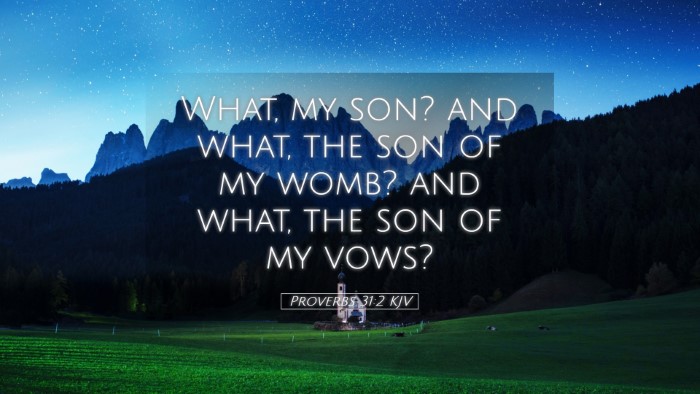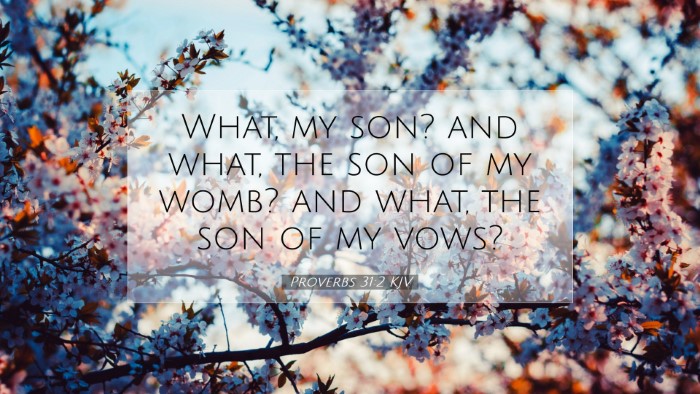Commentary on Proverbs 31:2
Verse: Proverbs 31:2 - "What, my son? And what, the son of my womb? And what, the son of my vows?"
Introduction
This poignant question posed in Proverbs 31:2 opens a discourse on the weighty responsibilities associated with parenthood and the moral guidance required for the upbringing of children. The verse serves as a prelude to a mother’s timeless advice to her son, traditionally understood to be King Lemuel. It reflects the concerns of a mother whose heart is intertwined with her child’s future.
The Voice of a Mother
In this verse, the mother addresses her son with deep affection, identifying him not just by his status but by the intimate relationship they share. Matthew Henry emphasizes that her inquiry underscores the seriousness with which she regards her role as a parent. The repetition of "what" draws attention to the weighty matters she is about to discuss, indicating that her teachings are not trivial but critical to his life.
Albert Barnes invites readers to consider the emotional depth behind her words. She speaks "my son," signifying a personal, loving connection, but also as “the son of my vows,” pointing to the promises and commitments made during his conception or birth. This reminds us of the spiritual implications of parenting, emphasizing that children are not merely biological entities but gifts entrusted to parents by God.
Reflection on Vows
The phrase "the son of my vows" holds significant theological weight. Adam Clarke interprets this as a reflection of the dedication and pledges made to God when the child was conceived or born. It prompts us to recognize the importance of bringing children before the Lord, grounding their lives in prayer and commitment from their very beginnings. Parents ought to acknowledge the divine possibilities in their children and dedicate them to God, asking for wisdom in raising them.
Implications for Parenting
The question posed by the mother not only expresses her heartfelt concern but also sets a stage for serious instructions that follow. Matthew Henry considers this as a call for the child to deliberate on his life choices, urging him to seek wisdom and understanding. This suggests that parents should ideally engage their children in a dialogue about their duties and responsibilities, promoting mutual understanding rather than mere obedience.
Furthermore, this verse embodies the struggle and hope of a parent. Barnes comments on the significance of 'vows' in relation to parenting, inferring that the child should be aware of the expectations set forth in the context of those vows. In this sense, parents are encouraged to share their aspirations and dreams for their children, fostering a nurturing environment where moral and spiritual growth can flourish.
Application for Pastors, Students, and Theologians
For pastors, the insights from Proverbs 31:2 underline the significance of catechesis in family and community life. It serves as a reminder that moral and spiritual education is an integral part of church life. Pastors can derive from this verse the importance of addressing families in their congregations with love and seriousness, encouraging them to take their roles as bearers of faith seriously.
Students of the Bible could delve deeper into the exegetical significance of maternal wisdom in biblical literature, understanding this verse as a microcosm of larger themes found throughout the Proverbs. They are encouraged to reflect on how this maternal voice resonates with other biblical passages that extol wisdom, particularly the personification of wisdom as a figure calling out to the youth.
Theologians should consider the implications of covenantal family dynamics introduced through this verse. The mother’s reference to ‘vows’ opens a rich conversation on the intersection of personal faith, familial obligations, and social responsibilities, inviting discourse on how these elements shape a Christian worldview.
Conclusion
Proverbs 31:2 stands as a profound reminder of the bond shared between parent and child, marked by love, commitment, and responsibility. The mother’s questioning reflects her dedication not just to her son but to the moral fabric of society. As we ponder these words, we are called to consider our roles within our families, our commitments to God, and the legacy of faith we impart to the next generation.


